GMC’s Kara Kessler ’11 Graduates from EcoLeaguer to Sustainable Entrepreneur
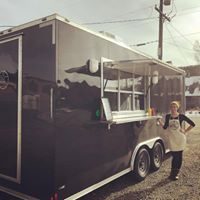
by EcoLeague Communications and Digital Media Assistant Claire Jeantheau, Dickinson ’21
Kara Kessler, a 2011 graduate of Green Mountain College, currently manages her own vegan food truck and holds a passionate interest in human relationships with the natural world. But discovering this path wouldn’t have been possible without her two-time exchanges through EcoLeague, marked by their experiential activities.
When she entered her first year at Green Mountain, Kessler was certain that she would study psychology—the high school class she found most interesting. After a “spontaneous” decision to go on an EcoLeague exchange in fall 2008 to Northland College, she learned the value of studying a broad mix of subjects.
“Green Mountain College had six hundred people at the time, so I decided that it’d be good to get out. And then I got [to Northland] and realized the importance of different areas of study, different professors,” Kessler recalled.
Kessler’s classes at Northland ranged from art and literature to adolescent psychology. However, it was a seminar on ecopsychology—a field examining relationships between humans and the natural world—that she found “the most intriguing, interesting, and defining”.
“I had a professor suggest ecopsychology,” Kessler explained, “and I had never heard of that, but it sounded very interesting. And so I studied ecopsychology… that’s when I realized I know what I want to do, I know what I want to learn more about.”
Having found her academic interest, she made the distinctive choice of completing a second EcoLeague exchange, this time at Prescott College in Fall 2010. By completing two exchanges, she was able to study ecopsychology in depth, particularly through her coursework at Prescott. Kessler credits EcoLeague with giving her the opportunity to discover a field that she wouldn’t have been able to explore at her home college.
“After my first EcoLeague experience, I realized … I can’t study [ecopsychology] at Green Mountain College, I’m going to pursue that individually, I’m going to research and tailor my degree to it.”
Because of EcoLeague’s experiential nature, many of Kessler’s favorite memories of her exchanges took place outside of the classroom. At Northland, she enjoyed studying near Wisconsin’s Lake Superior, a new environment from her home college in Colorado. There, she fondly remembers hiking in local wildlife and seeing the area’s aspens in the fall.
Later at Prescott, where she “got to take a lot of field trips,” she began her semester with a trip to Northern California to study sea psychology and marine biology for a month. The experience was made possible by Prescott’s unique schedule, which begins with an intensive three-week “Block” class before a typical pattern of semester classes.
Kessler now applies the interest in ecopsychology she cultivated in EcoLeague as the owner and operator of a vegan food truck. The Vegetable Express is based in Nederland, Colorado, and describes its goal on social media as “feeding your mind, body, and soul with plant-based foods.”
“On a different level, sustainably, I can heal the planet this way through plant-based eating, and I’m connecting to people and helping people psychologically through food. It’s been about how you relate to it, how you see it,” Kessler said, tying her EcoLeague studies to her current work. “[EcoLeague] definitely prepared me to do what I’m doing.”
If you are passing through Nederland, don’t forget to stop by Kessler’s Vegetable Express to support sustainability and, more importantly, to nurture the mind and body!
Green Mountain College Fall Open House
Prospective students and their families are invited to visit GMC and discover what makes the campus community so special. The day’s events include:
– Campus, farm, and sustainability tours.
– One-on-One chat sessions with faculty and staff members about academic programs and student support services.
– Ask questions of current students during the “student panel” time.
– Meet and greet with staff from athletics, clubs, and organizations around campus.
Green Mountain College Fall Open House
Prospective students and their families are invited to visit GMC and discover what makes the campus community so special. The day’s events include:
– Campus, farm, and sustainability tours.
– One-on-One chat sessions with faculty and staff members about academic programs and student support services.
– Ask questions of current students during the “student panel” time.
– Meet and greet with staff from athletics, clubs, and organizations around campus.
Green Mountain College Transfer Day
Green Mountain College is hosting a series of Summer Transfer Days designed for students who are exploring the option of transferring from another school. These events are also open to students who have suspended their post-secondary education and are interested in returning to college.
Visitors will receive a campus tour, a free lunch at the College’s Cerridwen Farmhouse with currentGMC students and faculty, and an on-the-spot admissions decision (for students with transcripts showing 24 or more credits). Students who RSVP can also meet with financial services professionals to discuss financial aid options, chat with coaches of our Division III interscholastic athletics programs, and meet with professors and student support staff.
“Small class sizes and personal attention are key attributes of a GMC education,” said GMC dean of enrollment management Jeffrey Mon. “We also counsel prospective students one-on-one about how to make a seamless transition into one of our 24 major programs, or help them develop their own self-designed major through our progressive program.”
Summer Transfer Day dates are June 17, June 28, July 11, July 21, August 2, and August 12. Walk-ins are welcome; students are encouraged to RSVP.
Green Mountain College Summer Transfer Day
Green Mountain College is hosting a series of Summer Transfer Days designed for students who are exploring the option of transferring from another school. These events are also open to students who have suspended their post-secondary education and are interested in returning to college.
Visitors will receive a campus tour, a free lunch at the College’s Cerridwen Farmhouse with currentGMC students and faculty, and an on-the-spot admissions decision (for students with transcripts showing 24 or more credits). Students who RSVP can also meet with financial services professionals to discuss financial aid options, chat with coaches of our Division III interscholastic athletics programs, and meet with professors and student support staff.
“Small class sizes and personal attention are key attributes of a GMC education,” said GMC dean of enrollment management Jeffrey Mon. “We also counsel prospective students one-on-one about how to make a seamless transition into one of our 24 major programs, or help them develop their own self-designed major through our progressive program.”
Summer Transfer Day dates are June 17, June 28, July 11, July 21, August 2, and August 12. Walk-ins are welcome; students are encouraged to RSVP.
“Farm Nimbly”: Food Sustainability at EcoLeague Schools APU and GMC
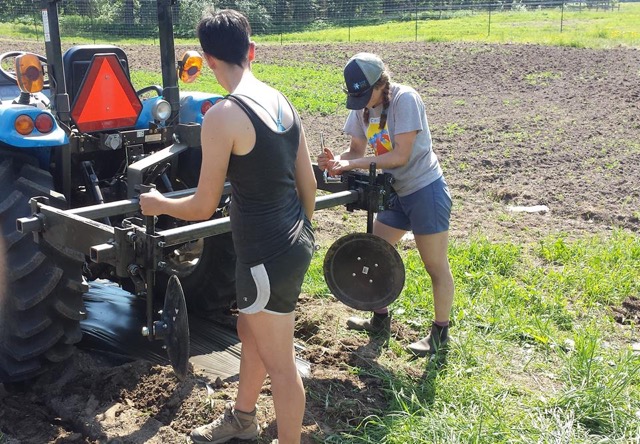
by Jasmyn DiMeglio, EcoLeague Writing Intern
“Growing food in the subarctic is not for the faint of heart,” says Megan Talley, manager of Spring Creek Farm in Palmer, Alaska. With cold, blustery winds and short growing seasons, sustaining a sturdy local food system in this region can be quite challenging.
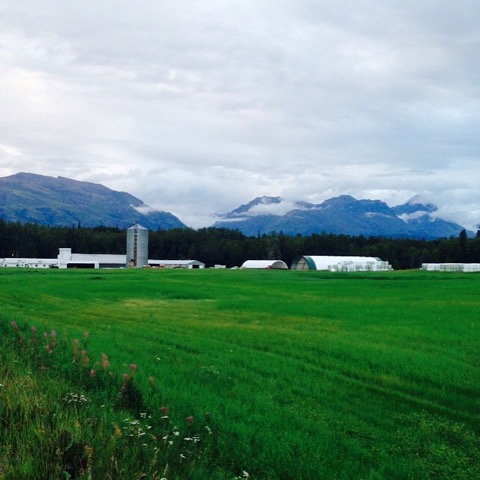
Spring Creek Farm in Palmer, Alaska
However, despite climatic obstacles, Alaska Pacific University’s Spring Creek Farm takes a progressive approach to providing surrounding communities with access to healthy, fresh, and locally grown food. A key part of this approach includes preparing the next generation of food justice activists with important skills and critical lenses to examine both economy and environment while farming in a rapidly changing world.
Meanwhile roughly 4,500 miles away, Cerridwen Farm integrates hands-on learning opportunities with Green Mountain College’s liberal arts education in Poultney, Vermont. Both projects of EcoLeague schools, Spring Creek and Cerridwen Farms are two comprehensive programs that offer ample opportunity for student action, community collaboration, and education in sustainable agriculture. Although located on opposite ends of the continent, the two farms share similar values and philosophies which include environmentally thoughtful growing methods, community building, and a focus on food justice.
As the two farms are located in extremely different bioregions, one might assume that their growing processes would differ as well. However, both GMC and APU’s programs face similar challenges of erratic climate conditions during their growing seasons.
“This part of the Earth is at the forefront of climate change. Unpredictable weather patterns, destructive climate events and soil erosion compound the threat to a secure local food system,” says Talley. Farmers in the Alaskan region also struggle with cold soil temperatures, plant “bolting” from the long hours of daylight, and very dry springs. Such conditions make it crucial that new growers are provided with the tools they need to “farm nimbly” and resist crop loss, which is something Spring Creek Farm strives toward year-round. Though these threats can be discouraging for any farmer, APU’s project and crops continue to thrive and Talley remains optimistic. “The low soil temperatures translate to the sweetest carrots anywhere,” she says.
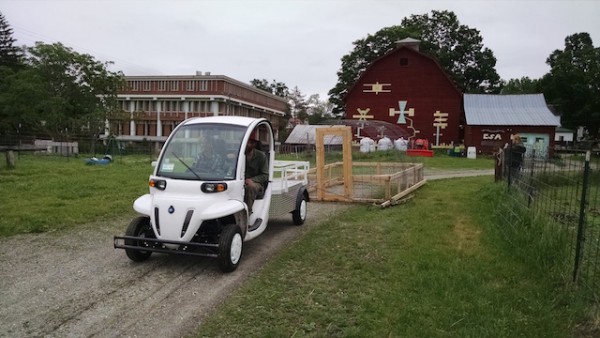
Day at Cerridwen Farm, GMC
“Farming nimbly” is a phrase that Vermont farmers can also appreciate as they grapple with complications of their own, some similar, some unique to their bioregion.
“In the last two years we have worked through a devastating hail storm, incredibly high winds, a record early freeze, and record low winter temperatures,” says Bay Hammond, the farm manager at Green Mountain College’s Cerridwen Farm. Due to these unpredictable weather patterns, GMC growers have become more dependent on their three-season houses. In addition to the outdoor Hillside Garden, the farm also has two High Tunnels and a hoop house for growing heirloom tomatoes, cucumbers, ginger, eggplants, and peppers year round. Though maintaining crops in erratic conditions can be difficult, Hammond believes each hardship becomes an opportunity for learning. These opportunities are always utilized by students involved at the farm. “The students are bright, entrepreneurial, and hard workers. They are dedicated to the farm and always step up to meet the challenges,” Hammond states.
GMC’s Farm and Food Program offers multiple avenues for student involvement at Cerridwen Farm. Some of these options include 1-3 credit skill intensive courses, work-study employment, or joining Farm Crew.
As Eleanor Tison, director of the Food Systems Program explains, “Farm Crew is an all-volunteer student organization overseen by the farm manager. Students in Farm Crew meet weekly, receive weekly email updates, and participate in running the farm.” This organization is a great way for students to apply the skills they learn in the classroom, as it offers many possibilities for engagement. Members of Farm Crew sign up for animal and vegetable chore slots, help with decision making, and become involved with special events, such as the GMC farmers’ market or the October Welsh Harvest Festival, which is an annual event open to the larger community of Poultney.
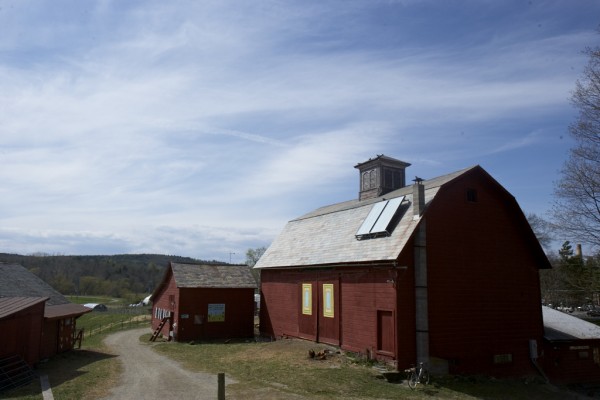
Cerridwen Barn at GMC
Special events are not the only opportunities for community engagement; Cerridwen Farm is always open and accessible to all interested visitors. “As our farm is adjacent to residential neighborhoods in the town of Poultney, we have daily visitors who visit the chickens, pigs, cattle, goats, sheep, and ducks on our farm,” says Tison. GMC also operates a self-serve “farm store” which is open 24/7 for customers looking to purchase eggs, seasonal produce, and frozen meat products.
These EcoLeague Farms are major resources for community collaboration and creative thinking in both Poultney and in Anchorage, AL.
“Community building is the basis for cultivating the Alaskan food movement. We strive to be a hub for sharing meals and ideas which will usher in a more robust and resilient local food system,” says Talley. APU’s program regularly hosts community volunteer opportunities and workshops, which are open to all, students and non-students alike. These workshops encompass many exciting topics such as native plants and permaculture design. Like the Cerridwen Farm, Spring Creek also operates a small-scale Community Supported Agriculture Share (CSA) and has a booth at the community farmers market in Anchorage. Talley describes the downtown market as a “vibrant community staple and social event” that brings folks together on a weekly basis.
The CSA program and farmers market are only two of four destinations for the produce grown through the program. Another place where Spring Creek Farm’s vegetables are used is on campus in the cafeteria. As much food as possible is distributed to dining services, but the farm also donates a portion of their bounty to low income-families through their “Alaska Tilth” program. In a fight to end hunger, Alaska Tilth was founded in collaboration with the University of Alaska’s Experiment Farm and the cooperative extension of the Supplemental Nutritional Assistance Program (SNAP).
“The fresh food our farm donates is brought to food pantries each week by a SNAP educator who demonstrates seasonal cooking with fresh ingredients, sharing a meal with those in need,” says Talley. Only within its first year of operation, Alaska Tilth has been a huge success and has plans for expansion in 2017.
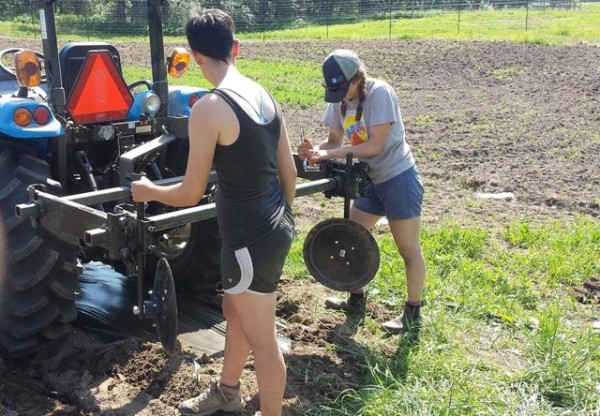
Fixing the Tractor, Spring Creek Farm
Both Spring Creek and Cerridwen Farms work as springboards for larger visions of the future. Exemplifying strong commitment to their communities, to the futures of their students, as well as to the land, these EcoLeague programs are able to thrive year round, despite climatic hardships. Offering multiple opportunities for involvement, an abundance of locally grown food, and important skills for future generations, the programs set great examples for farmers nationwide.
EcoLeague Stories: Green Mountain College

“Any experience where you are immersed in a different culture is worthwhile. Experiencing a different way of life will make you more critical and appreciative of your own beliefs and values.”
Sophie Holtz, a junior at Northland College, in an interview about her EcoLeague exchange to Green Mountain College. Read more about Sophie’s story, and how EcoLeague exchanges expand a student’s academic career and worldview at Northland’s Meet Our Students page.
Fall 2015: EcoLeague Exchange Students On The Move!
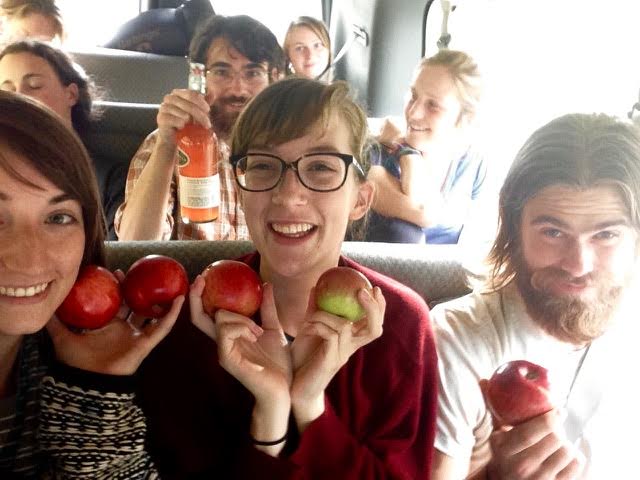
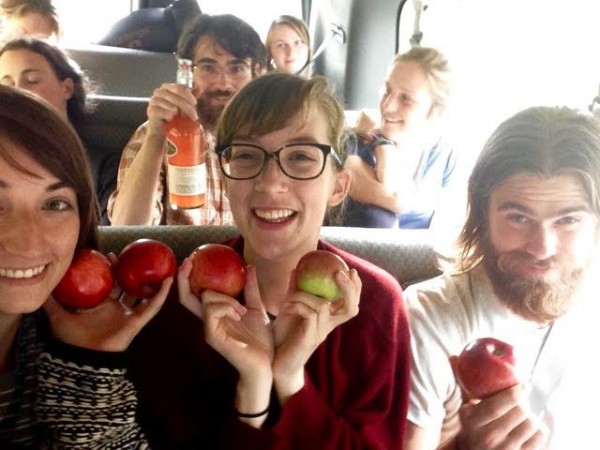
Claire Jordy (center) returning from a 2-day field trip to Vermont to study apples as part of the course “The History of Apples”. Claire is currently on exchange to COA from Dickinson.
by Jazzy DiMeglio, EcoLeague Writing Intern
What moves us, physically and figuratively? For one student, it might be an interest in apples that sparks an entire track of education. For another, a passion for soil and social justice that inspires plans for urban farming. Or perhaps it is simply a change of place that refreshes our perspective.
Claire, Emmanuel, and Elena are three of fifteen students participating in the EcoLeague exchange program this fall. A consortium of six different liberal arts colleges across the country, the EcoLeague allows students to shift their studies to another school for a semester or two during their undergraduate career. Located in different bioregions and with unique campus cultures, each EcoLeague college remains connected to the others by core values of environmental awareness, social change, and sustainability. While exploring new ecosystems, new communities, and new academic courses, the EcoLeague student is challenged to develop skills and perspectives that will not only enrich their education but also prepare them for life after college.
“I feel like I’m making a tool box,” says Claire Jordy, a junior, majoring in Environmental Studies. Currently, Claire is studying on the brisk shores of Bar Harbor, Maine, at College of the Atlantic. Although less than half the size of Dickinson College, her “home” school, COA still offers unique courses that she wouldn’t be able to take at home. Learning new skills she will be able to apply to her senior project is a major benefit of participating in an EcoLeague exchange.
“COA offers more ‘site specific’ courses,” she says. One class that drew Claire to the college is “The History of Apples.” In this course she and her classmates learn how to identify apples of the region and study the importance of preserving seedling variety. Claire dreams of one day owning her own orchard, so “The History of Apples” is especially relevant to her future aspirations. Additionally, at COA, Claire is able to work on anthropologic research methods, which she plans to use for a capstone project at Dickinson. Aside from the academics, another highlight of the EcoLeague experience for Claire has been living in a new setting. Though a bit chilly, she likes swimming in the Atlantic Ocean and hiking in the mountains of Arcadia National Park.
While Claire enjoys unique courses and exploring new landscapes in Maine, Emmanuel Greeno is developing a deeper appreciation for his home of COA while studying in Arizona this semester.
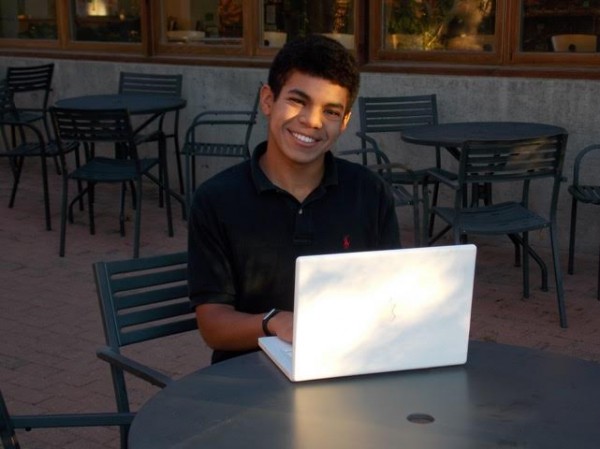
Emmanuel Greeno enjoys working outside in the surprisingly mild temperatures of Prescott, Arizona. Greeno is currently on exchange to Prescott from COA.
“I like the academics and the people here, but I really love my ‘home’ school even more now,” says Greeno of his experience at Prescott College. Also a junior, Emmanuel is on track to graduate with a Bachelor of Arts in Human Ecology, the self-directed, interdisciplinary degree that is COA’s trademark. Although immersing himself in a new community has been a high point for Emmanuel, it has also been a challenge. Prescott conducts most of its classes in the field and the majority of its students live off-campus, a sharp contrast to COA’s island location where most undergraduates are in close proximity to one another. At his home school of roughly 350 students, the community is very tight-knit, something he misses at Prescott. One place he notices this difference is in Prescott’s dining cafés, which are set-up restaurant style. Emmanuel describes eating as a “human ritual” and misses the cafeteria at COA, which is not only a place to eat, but also a place to “take a break” and connect with others.
Despite these differences, Emmanuel is enjoying his time in Arizona. A major plus for him is the academic structure available at Prescott. This semester he is taking all psychology courses. He likes that at Prescott, the psychology classes are already “established” and he can simply enroll in them, rather than having to construct a course on his own through independent study.
Going home with a fresh perspective is something else Emmanuel looks forward to adding to his education, much like Elena Santos, who has traveled from Green Mountain College in Poultney, VT to Dickinson College in Carlisle, PA for the semester. With hopes of one day starting an urban farm, Elena chose to go on an EcoLeague exchange to help her accomplish this goal. By pairing her studies in Sustainable Agriculture and Food Systems at GMC with sociology-based courses at Dickinson, she feels more prepared to farm in cities with diverse populations.
“There are a lot of perspectives at Dickinson that aren’t available at Green Mountain,” she says. Although sustainability and small class sizes are shared values at both GMC and Dickinson, Elena has noticed more differences than similarities between the two institutions. With over 2,000 students, Dickinson has a wide array of clubs and organizations to get involved with, such as dancing or language clubs. While GMC specializes in courses taught through an environmental lens, Dickinson’s curricula emphasizes multi-cultural studies, a combination Elena appreciates being able to build into her academic career.
“There are more professors of color here! That really excites me,” she says. Additionally, Dickinson hosts many international students, which creates a diverse social climate on campus. Right now, Elena is taking two courses in Gender Studies as well as the course “African American Food Ways”. Incorporating more world-views into her studies has been the best part of her EcoLeague exchange.
An EcoLeague exchange provides students with the opportunity to follow their passions. According to Claire, Emmanuel, and Elena, following passion pays off. Whether it be useful skills for a future career, a new-found appreciation for home, or increased cultural awareness, these students will return to their colleges enriched by their exchange. Movement, both physical and figurative, is possible through EcoLeague.

